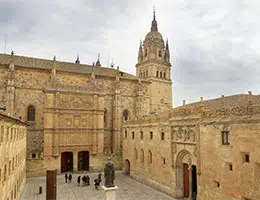 The etymology of bachelor takes us to the medieval Latin licentiatura , itself derived from licentiare . The academic degree that is achieved after completing higher education studies of between four and six years in duration is called a bachelor's degree. After obtaining the bachelor's degree, the graduate can continue studying to obtain the doctorate .
The etymology of bachelor takes us to the medieval Latin licentiatura , itself derived from licentiare . The academic degree that is achieved after completing higher education studies of between four and six years in duration is called a bachelor's degree. After obtaining the bachelor's degree, the graduate can continue studying to obtain the doctorate .
Beyond constituting a university degree, the bachelor's degree also represents an endorsement to carry out a certain job at a professional level. It is understood that the graduate (that is, who has a degree) has the technical or scientific knowledge necessary to carry out different tasks specific to his specialty.
The structuring of academic degrees depends on each country. At a general level, it can be said that the bachelor's degree is a university degree : to access the possibility of pursuing these studies, it is necessary to have previously completed secondary education (which is reached, in turn, after having finished primary education. ).
A law degree is an example of a bachelor's degree. Anyone who completes these studies becomes a lawyer and is able to intervene in different ways in a judicial process.
Whoever obtains a degree in social communication or communication sciences , meanwhile, becomes a communicator . This professional is prepared to analyze and produce content in the media, to name two alternatives.
It should be noted that many bachelor's degrees can be taken both in public education and in private establishments. The possibilities depend on each subject and region.
The history of the bachelor's degree takes us to the Major Schools , a building that Pope Luna ordered to be built in the year 1411 in the first Constitutions and that was only completed in 1533. At that time, the degree of Bachelor was granted only at the University of Salamanca and had a validity higher than that of " Bachelor ", a title considered minor, since it was obtained in the so-called Minor Schools .
Centuries later, their equivalents in Spain would be the bachelor's degree and the diploma, which are now considered extinct.
In recent years, the bachelor's degree began to lose strength in Spain compared to the so-called bachelor's degree or, simply, degree , a university degree that is part of the "new norm ." Although they are considered equivalent, the latter has certain advantages over the former.
 The reason for this transition to the bachelor's degree was the gradual integration of the Bologna Process into the educational system, with which several qualifications were changed to the degree, such as the diploma and engineering.
The reason for this transition to the bachelor's degree was the gradual integration of the Bologna Process into the educational system, with which several qualifications were changed to the degree, such as the diploma and engineering.
The Bologna Process is called the one that began with the Bologna Declaration , an agreement that the Ministers of Education of several countries on the European continent signed in 1999 in the Italian Bologna to begin an era in which the exchange of degrees and the adaptation of content to the demands of society was easier.
With the degree it was possible to access a job after a period of study of between four and five years. In Spain, it also opened the doors to the study of an opposition. The degree ended the old distinction of degrees based on the length of study: all degrees take four years.
Despite the situation of the bachelor's degree in Spain, other countries continue to grant it in certain universities. Such is the case of Portugal, which did not eliminate it after the Bologna process. Since 2006, the duration of a degree of this type is usually between three and four years. One of the most common is Medicine, although a Master's degree is required to practice the profession .
